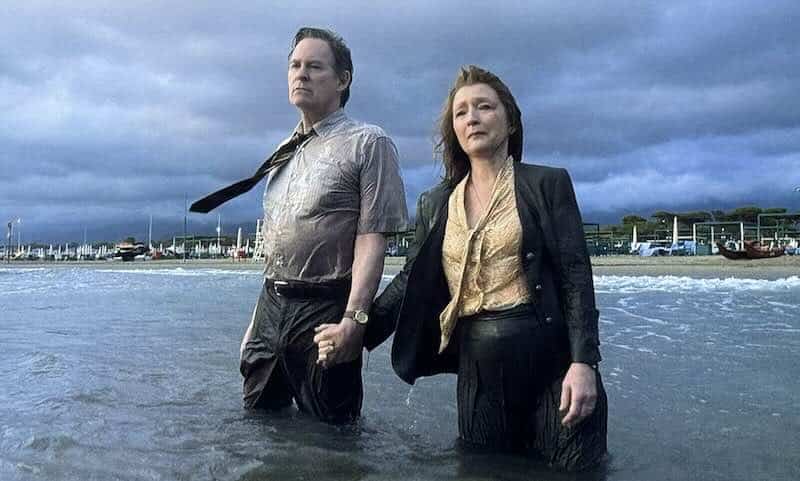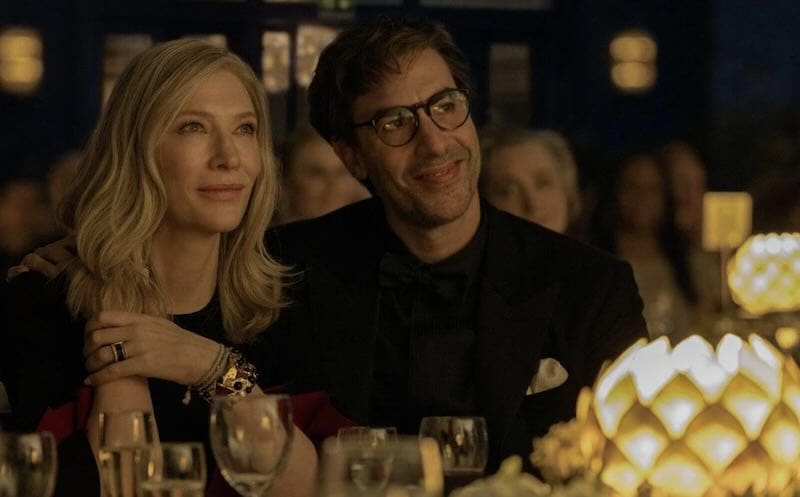Disclaimer opens with a warning not to trust what you see in the frame. Then it proceeds to show you how misunderstood photographs can destroy your life.
Disclaimer was written and directed by Alfonso Cuarón. I was not impressed by this 7 part series. I found it confusing and all over the place. The tension you would expect in a thriller was not there until the very end. I saw the twist at the end coming, which is not something you want in a suspense thriller.
Catherine (Cate Blanchett) is a documentary filmmaker. She’s married to Robert (Sacha Baron Cohen). They have a grown son, Nicholas (Kodi Smit-McPhee). Much of the story takes place 20 years in the past, in Italy. Nicholas was a child. Catherine was played by Leila George as a young woman.
One day in the present Catherine finds a book beside her bed. It’s about her, about something that happened years ago in Italy. She recognizes the story but gets very upset about it. She seeks out the author to ask him to stop sending the book around to her family and people she knows.

The book was written by Nancy (Lesley Manville). Years after her death her husband Stephen (Kevin Kline) finds a manuscript and a set of sexually explicit photos of young Catherine and Stephen and Nancy’s son Jonathan (Louis Partridge).
Stephen self-published the book and sent it to Robert and Nicholas. Robert realized it was about his family and believed everything in the book about an affair Jonathan and his wife had.
Young Nicholas had almost drowned. He was saved by Jonathan, who did drown. In her book, Nancy blamed Jonathan’s drowning on Catherine.

Stephen gleefully plans to destroy Catherine and her son based on what he’s read in his wife’s book. Catherine is chasing around after him trying to talk to him about the book. Robert is jealous and angry and plans to leave Catherine.
When Catherine finally gets her chance to tell her side of the story to Stephen, things change. Cate Blanchett was a minor actor through most of the series which was heavy with flashbacks. In the last episode, when she finally tells her story, Cate Blanchett gets to dominate the series. She’s finally being heard and her story is dynamite.
The cast in this was very good, as you would expect from such quality people. Kevin Kline was particularly interesting as the elderly old coot bent on revenge. The characters were different from anything you’ve seen these actors do before. I found that pleasing. Cate Blanchett was obsequious and servile through most of it – not what we usually see. Lesley Manville fell completely apart with the death of her son. Kevin Kline was deadly in his bedroom slippers and too-tight cardigan.
Even with all that going for it, I found Disclaimer scattered and definitely below what you’d expect from a cast like this and director like Alfonso Cuarón. It’s streaming on Apple TV+ if you want to give it a try. Please share what you thought of it if you do give it a watch.


Leave a Reply